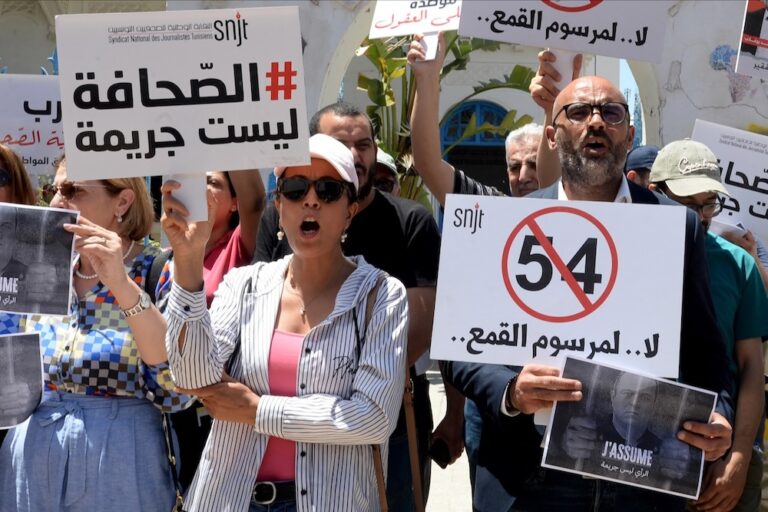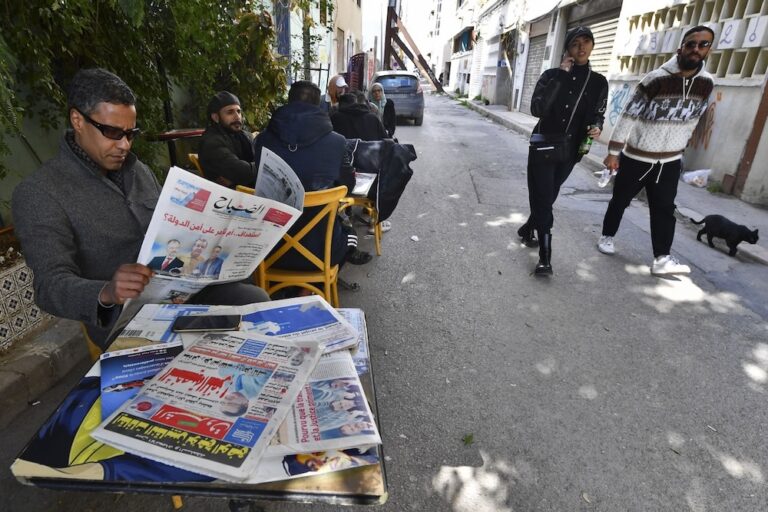(IFJ/IFEX) – The following is a 14 January 2008 IFJ media release: IFJ Welcomes Launch of Tunisia’s New Union as Internet Ban is Lifted Leaders of the International Federation of Journalists (IFJ) today welcomed “historic reform” within Tunisian journalism following the creation of a new union of journalists and the lifting of a two-year ban […]
(IFJ/IFEX) – The following is a 14 January 2008 IFJ media release:
IFJ Welcomes Launch of Tunisia’s New Union as Internet Ban is Lifted
Leaders of the International Federation of Journalists (IFJ) today welcomed “historic reform” within Tunisian journalism following the creation of a new union of journalists and the lifting of a two-year ban on the IFJ’s web-site, only weeks after the Federation accused the government of being “stuck in a political groove of media manipulation.”
Tunisia’s journalists created a national trade union for themselves at the weekend, dissolving in the process the Association of Tunisian Journalists. The new Syndicat National des Journalistes Tunisiens will focus on improving the poor working conditions of journalists as well as defending journalists’ professional rights.
“It has been a momentous couple of days,” said Aidan White, IFJ General Secretary. “This is historic reform. Tunisian journalism has an opportunity for a fresh start in a country where journalists have suffered for too long.”
The IFJ President Jim Boumelha was present at the journalists’ congress and received a standing ovation after a spirited intervention calling for the ban on the IFJ’s web-site to be lifted and for action to combat the threat of poor working conditions.
The decision to create the syndicate and news the ban had been lifted, which was announced during the Congress, were greeted with emotional scenes among delegates, said Boumelha.
Access to the IFJ’s web-site was barred in Tunisia two years ago following criticism of the Government by the IFJ at the World Summit on the Information Society, which was held in Tunis at the end of 2005. “This is a sign that at last attitudes may be changing and moving in the right direction,” said White. In November, which marked the 20th anniversary of coming to power of President Ben Ali, the IFJ challenged the government to change its approach to media and free expression.
“There is still a long way to go,” he said. “Other web-site bans remain in place, such as those on independent weeklies Al Maoukif and Mouatinoun, and these must be lifted too, but there is a real sense of change on the way.”
The IFJ also says that the reforms create a new opportunity to encourage a unified movement of journalists in Tunisia. Boumelha summed up the new mood of optimism. “A new leadership has been elected for a new union which has within it the power to set a fresh course for journalism and to tackle the precarity that denies social justice and damages media,” he said.
The IFJ represents over 600,000 journalists in 120 countries worldwide.


